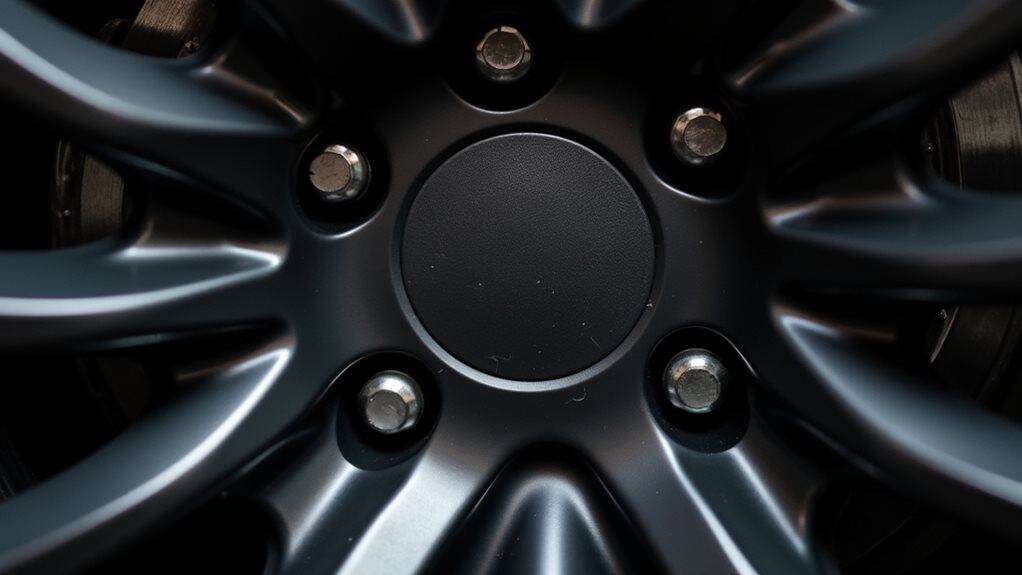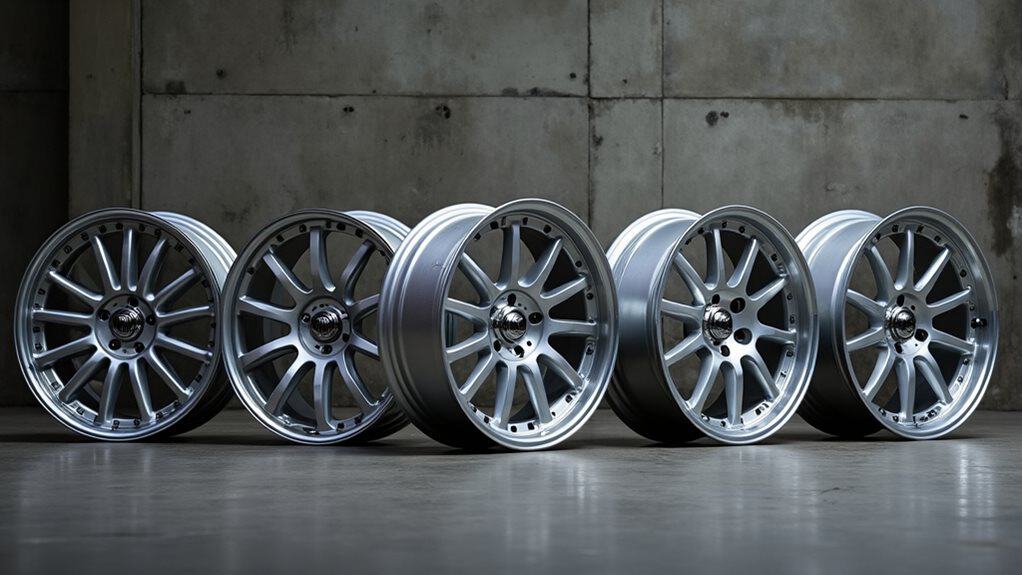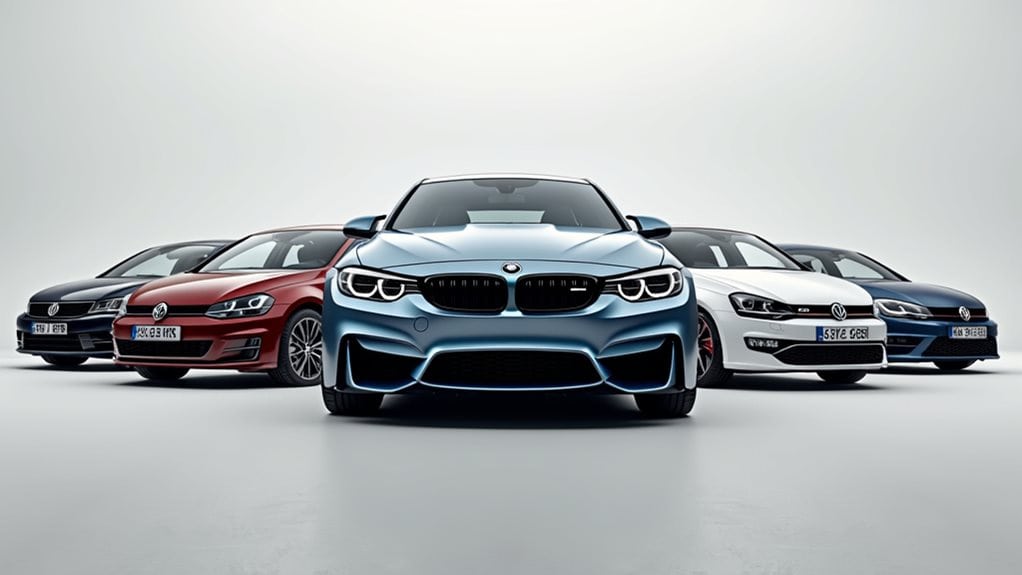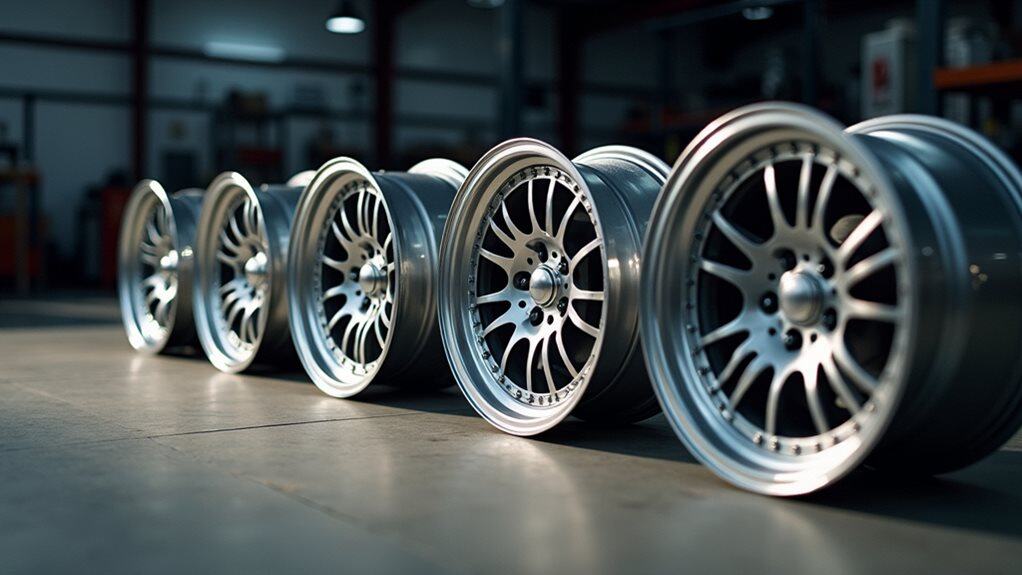You’ll find 5×112 wheels fit most Audi models including A4, TT, and Q-series SUVs, select BMW 1 and 2 Series from 2017 onwards, Volkswagen Passat and Golf from late 1990s, plus Mercedes-Benz C-Class and E-Class vehicles with their SUV counterparts. This bolt pattern features five lug holes arranged in a 112mm diameter circle, requiring exact matching with your vehicle’s hub to prevent wheel wobble and maintain ideal performance. Understanding additional fitment specifications guarantees you’ll make the right choice for your specific vehicle.
Quick Tips
- 5×112 bolt pattern is standard across most Audi models including A4, TT, Q3, Q5, Q7, Q8, and e-tron SUVs.
- Volkswagen vehicles from late 1990s onward use 5×112, including Passat, Golf MK5+, Jetta, and Tiguan models.
- Mercedes-Benz C-Class, E-Class sedans and GLC, GLE SUVs feature 5×112 with 66.6mm center bore specifications.
- Select newer BMW models from 2017+ use 5×112, including certain 1 Series and 2 Series variants.
- Proper offset and center bore matching is crucial for safe fitment and optimal performance across all brands.
Understanding the 5×112 Bolt Pattern Specifications

When you’re shopping for new wheels, understanding the 5×112 bolt pattern becomes essential for ensuring proper fitment and safety.
This specification means five lug holes are arranged evenly in a circle with a 112-millimeter diameter. The pattern must match your vehicle’s hub exactly, as even small differences can cause dangerous wheel wobble or complete incompatibility issues. Cooling fans are crucial for maintaining optimal engine temperature, which is especially important when selecting wheels that enhance performance.
The 5×112 configuration is commonly found on European vehicles such as Audi and Volkswagen, providing the secure connection needed for high-performance driving characteristics.
Audi Models Compatible With 5×112 Wheels
When you’re shopping for 5×112 wheels for your Audi, you’ll find that most modern models from the mid-2000s onward use this bolt pattern, making wheel selection relatively straightforward. The A4 series, including sedans and Allroad wagons from B6 generation forward, consistently features 5×112 compatibility across multiple generations. Notably, these vehicles often benefit from superior airflow characteristics that enhance overall performance. Your TT models from Mk2 and Mk3 generations, along with SUVs like the Q5 and SQ5, also share this same bolt pattern, which simplifies the process of finding aftermarket wheels that’ll fit properly. You’ll discover popular wheel sizes like 17, 18, 19, 20, and 22 inches readily available for your Audi’s 5×112 bolt pattern.
A4 Series Compatibility
Since the A4 series represents one of Audi’s most popular sedan lines, understanding its wheel compatibility becomes essential for owners considering upgrades or replacements.
All A4 models from B6 through B9 generations use the 5×112 bolt pattern, making wheel selection straightforward.
You’ll need wheels with ET35-ET45 offset and 66.5mm center bore for proper fitment.
TT Models Overview
Two distinct generations of Audi TT models employ the 5×112 bolt pattern, making them compatible with a wide range of aftermarket and OEM wheel options.
You’ll find 18″ and 19″ diameter wheels standard on these vehicles, with 9J width and ET52 offset specifications.
S-Line variants maintain identical bolt patterns while featuring lightweight alloy construction for enhanced performance characteristics.
SUV Line Fitment
Five distinct SUV models in Audi’s lineup employ the 5×112 bolt pattern, creating extensive compatibility options for wheel upgrades and replacements.
You’ll find this fitment across Q3, Q5, Q7, Q8, and e-tron models, including their performance variants like SQ5, SQ7, and RS Q8.
Wheel sizes range from 17 inches on smaller models to 22 inches on larger SUVs.
BMW Vehicles Using 5×112 Bolt Pattern
Most BMW vehicles follow the brand’s standard 5×120 bolt pattern, but several newer models have adopted the 5×112 configuration that’s common among other European manufacturers.
You’ll find this pattern on specific 1 Series models like the F20 and F40 from 2017 onwards, plus certain 2 Series variants including the F40 and G40 introduced in 2019 and 2021 respectively. Regular inspections of electrical systems, including fusible links, can help maintain vehicle performance and safety.
Volkswagen Cars With 5×112 Compatibility

While BMW has only recently adopted the 5×112 bolt pattern for select models, Volkswagen has welcomed this configuration across many of its vehicle lineups for decades. You’ll find this pattern on Passat models from 1998 onward, Golf variants from MK5 generation, Jetta models after the late 1990s, and Tiguan SUVs from mid-2000s onwards. This widespread compatibility may help alleviate some of the perceived maintenance costs associated with owning a Volkswagen.
Mercedes-Benz Models Featuring 5×112 Wheels
Mercedes-Benz has standardized the 5×112 bolt pattern across most of their popular sedan models, making wheel compatibility straightforward for owners of C-Class and E-Class vehicles.
You’ll find that these sedans share identical mounting specifications, which means aftermarket wheels designed for one model will typically fit the other without modification.
The brand’s SUV lineup, including the GLC and GLE models, also employs this same 5×112 pattern, creating excellent cross-compatibility between Mercedes-Benz’s sedan and SUV platforms.
C-Class and E-Class
Two of the most popular luxury sedan series from Stuttgart showcase the versatility and standardization of the 5×112 bolt pattern across multiple generations.
Your C-Class models, including W202, S202, and CL203 variants, maintain consistent 66.6mm center bore specifications with offset ranges from 31-45mm.
E-Class generations like W210 and W212 share identical bolt patterns while accommodating wheel diameters from 15-20 inches.
SUV Models Coverage
Five distinct SUV series from the Stuttgart automaker demonstrate how the 5×112 bolt pattern extends beyond traditional sedans into the luxury crossover and SUV market.
You’ll find this configuration on GLB-Class, GLC-Class, EQS SUV, GLE-Class, and GLS-Class models.
These vehicles typically use wheel offsets between +35mm and +50mm, with center bores measuring 66.6mm for proper fitment.
Additional Vehicle Brands Supporting 5×112 Pattern

Beyond the most commonly recognized German automotive manufacturers, numerous other vehicle brands have adopted the 5×112 bolt pattern across their lineups, creating a surprisingly extensive network of wheel compatibility.
You’ll find this configuration in luxury brands like Bentley, Lamborghini, and McLaren, alongside select Ford models including the Galaxy and Territory, plus specific Chrysler and Dodge vehicles manufactured after 2011.
Key Fitment Considerations Beyond Bolt Pattern
While sharing the same 5×112 bolt pattern creates a foundation for wheel compatibility across these diverse vehicle brands, several additional fitment factors determine whether wheels will actually descend properly on your specific vehicle.
You’ll need to verify hub bore diameter, wheel offset, backspacing, brake caliper clearance, and proper lug nut specifications for safe installation.
Aftermarket Wheel Options for 5×112 Vehicles

The aftermarket wheel industry offers an extensive selection of 5×112-compatible options that span every budget range and style preference.
You’ll find premium brands like BBS, OZ Racing, and Vossen alongside affordable choices from Enkei and XXR.
Popular finishes include black, silver, and bronze, while sizes typically range from 17 to 20 inches for most applications.
Wrapping Up
You now understand that 5×112 wheels fit numerous vehicles across multiple manufacturers, including Audi, BMW, Volkswagen, and Mercedes-Benz models. However, you can’t simply match bolt patterns alone. You’ll need to verify offset specifications, center bore dimensions, and load ratings before purchasing aftermarket wheels. Always consult your vehicle’s manual or a tire professional to confirm proper fitment. This all-encompassing approach prevents costly mistakes and guarantees peak performance, safety, and handling characteristics for your specific vehicle.




